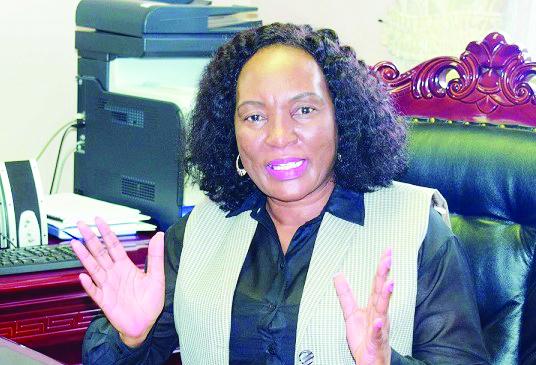Africa-Press – Lesotho. Acting Auditor General, Monica Besetsa, has made damning findings against the Office of the Prime Minister concerning the establishment of the National Emergency Command Centre (NECC) and its successor, the National Covid-19 Secretariat (NACOSEC).
Finance minister Thabo Sofonea tabled the Auditor General’s report on the government’s consolidated financial statements for the year ended March 31, 2020, in parliament yesterday.
Besetsa discovered that there was generally no compliance with the existing legal framework when NECC and NACOSEC were established last year by former Prime Minister Thomas Thabane and incumbent Prime Minister Dr Moeketsi Majoro, respectively.
NECC was established by Thabane in March 2020 to spearhead the nation’s plan to contain the spread and mitigate the negative impact of the coronavirus. Thabane stepped down two months later and was replaced by his finance minister Majoro to complete his term without a national election.
Majoro then disbanded the NECC in June last year to replace it with NACOSEC and appointed Thabo Khasipe, Commissioner-General of the Lesotho Revenue Authority (LRA), to lead it. Both NECC and NACOSEC’s legality was questioned from several quarters within and outside the government, which rendered them unable to function.
Matters nearly got out of hand after a letter alleging that Khasipe – already earning a substantial salary as head of the tax authority – was set to earn M428 016 per annum at NACOSEC, was leaked on various social media platforms.
He resigned barely two months after his appointment without giving reasons and went back to the LRA. For some time after his resignation, NACOSEC looked like it was abandoned and hardly did much apart from announcing the daily tally of new Covid-19 infections, deaths and recoveries.
In her report published yesterday, Besetsa noted that her office carried out an audit on the government’s response to the Covid-19 pandemic to assess compliance with the existing rules and regulations.
The audit also assessed “preparedness of the government for the crisis and compliance with relevant authorities in creating awareness on maintaining public health during the crisis.
”
The audit concluded that the country’s existing laws, regulations, operating structures and operational frameworks that were established before the advent of the coronavirus are adequate to respond to an emergency or disaster.
Those laws and regulations are the Disaster Management Act of 1997, the Disaster management Regulations of 1997, the Disaster Management Manual and the National Disaster Management Plan.
The Disaster Management Act establishes the Disaster Management Authority (DMA) whose purpose, according to the Auditor General’s report, is to control and coordinate disaster-related activities undertaken by relevant government agencies during emergencies arising out of natural and man-made disasters.
“However, instead of strengthening the existing structures, the government opted to establish new ones, such as the NECC and NACOSEC, at the time of emergency and, in the process, there was non-compliance to national laws and regulations,” reads the report.
To substantiate her assertion that the establishment of NECC and NACOSEC did not comply with the laws, Besetsa delivered damning reports on both institutions.
Here are the highlights: On NECC: It was discovered that NECC took over the responsibility of the Chief Executive Officer of DMA and prepared an Integrated National Response Plan and Budget.
This is despite that Section 6 of the Disaster Management Act requires that upon the declaration of a disaster, the CEO should prepare an appropriate National Disaster Relief Plan and, following its endorsement by the DMA board and approval by cabinet, implement and maintain that plan.
It was found that NECC was led by a sub-committee of 12 ministers supported by the technical advisory team of senior officials. However, members of the taskforce were not published in the gazette, contrary to the requirements of Section 8 of the Disaster Management Act.
The then Minister of Health, Nkaku Kabi, acted beyond his powers by declaring ’Manthabiseng Convention Centre as the National Emergency Centre for Covid-19.
Section 17 of the disaster management regulations gives the CEO of DMA authority to set up the national operations centre in Maseru at the DMA’s executive headquarters.
It was not clear how NECC was engaging with stakeholders to the extent that some entities pulled out their assistance towards the pandemic. Sections 23 to 27 of the Disaster Management Act define key stakeholders and provide for stakeholder engagement in times of disaster.
On NACOSEC: The Auditor General said it was of great concern that the establishment of a body such as NACOSEC had been made by subordinate legislation, instead of being enacted by an act of parliament.
She said the legality of the legal notice which established NACOSEC was therefore highly questionable. The legal notice stated that NACOSEC should provide professional support without defining what professional support entails in this context.
This led to ambiguity in interpreting professional support. NACOSEC was moved from ’Manthabiseng Convention Centre, which was declared National Command Centre for Covid-19, to Avani Maseru.
There was no evidence that Avani Maseru was declared a National Operations Centre as required by law. Powers of coordinating key ministries involved in managing the Covid-19 pandemic remained a challenge as there were no clear guidelines on how these ministries should engage.
As such, coordination of functions established by the Disaster Management Act was at stake, leading to the likelihood of uninformed decisions by the government.
In July 2020, the CEO of NACOSEC requested the release of government personnel from the Government Secretary (GS) to join NACOSEC. The Auditor General could not establish how the expertise of those individuals would provide professional support that specifically relates to Covid-19.
Staff deployment at NACOSEC was not done in consultation with the Public Service Commission as required by the Legal Notice No. 61 of 2020 (2) rather, appointments were done by the CEO of NACOSEC.
Contracts of employment for NACOSEC staff stated that they would be paid state salaries and other benefits yet appointments were made during a national crisis, for which the Disaster Management Act accords the responsible minister powers to utilise resources – human and financial – that are within reach from all sectors of government.
Officers deployed at NACOSEC were given contract appointments ranging from four to six months starting from July 2020. Contract appointments attract benefits such as gratuity payable upon termination thereby increasing government expenditure.
Some employment contracts stipulated a monthly honorarium payable to the value of M20 000 per month. That was against the government policy which requires that honoraria should not exceed M5 000 and is payable once on completion of a special assignment.
Some of the human resources’ expertise deployed at NACOSEC resembles those that already exist within DMA or other ministries, of which the minister has powers to transfer in case of an emergency. The number of filled and vacant positions at NACOSEC could not be established as the staff complement was not provided at the time of audit.
In light of these findings against NECC and NACOSEC, the auditor general concluded that the establishment of these two entities that performed the functions of DMA, instead of empowering and supporting DMA to combat the spread of Covid-19, frustrated the country’s preparedness to disasters.
Besetsa stated in her report: “I have not received a response from the Office of the Prime Minister, which is responsible for disasters, on the report on Compliance to Laws and Regulations in Response to Covid-19 issued in September 2020.
I assume they agree with my findings. ” Public Eye reported in January this year when the second wave of Covid-19 was wreaking havoc that there were many reasons behind the increasing infections and death toll.
This publication indicated that one of the reasons was that the government fumbled in the early days of the coronavirus outbreak in Lesotho when the chances of containing and stopping the virus were highest.
Public Eye also indicated that the government’s response to the Covid-19 pandemic was so shambolic that it could be described as wasted time and resources in the fight against the Covid-19 pandemic. The auditor general’s findings on government’s response to Covid-19 dovetail neatly with this publication’s observations.
For More News And Analysis About Lesotho Follow Africa-Press




![THE RULING PARTY [RFP] LAUNCHED FIRST DIASPORA COMMITTEE THE RULING PARTY [RFP] LAUNCHED FIRST DIASPORA COMMITTEE](https://static.africa-press.net/lesotho/sites/62/2026/02/sm_1771878934.036281-218x150.jpg)

